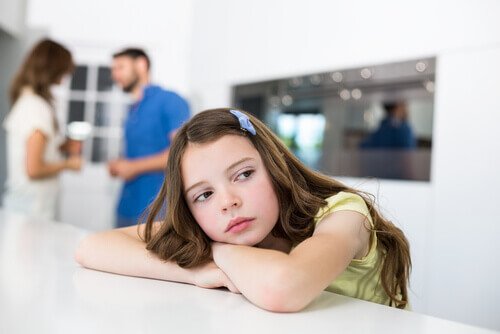Is Boredom Good for Children?


Reviewed and approved by the psychologist María Alejandra Castro Arbeláez
Boredom is literally defined as a “feeling of annoyance caused by lack of fun and interest in something.” Looking at this definition, it’s normal to ask ourselves if boredom is good for children.
The answers that most psychologists give is that it’s beneficial for children to be bored sometimes. From this negative feeling, they learn to be self-sufficient. In addition, it stimulates the need to be creative.
If your children frequently complain that they’re bored, we’ll give you some tips to help them handle the situation in the best way possible.
Is boredom good for children?
Boredom stems from a lack of motivation. When children can’t focus on an activity, they seek to fill their time with a task that meets their expectations.
This happens for many reasons. The first, and most obvious, is because kids have so much energy. Therefore, they’re proactive and constantly exploring.
Meanwhile, the second is because of changes in their daily routines. Children can go from classes, learning, playing and interacting with peers to a state of rest or inactivity.
The truth is, parents generally have mixed feelings when kids say they’re bored. They feel like they need to quickly fix this problem and find an immediate solution. However, is that the right thing to do?

How to deal with boredom in children
When kids are bored, there are three ways to change this situation. One of them is to give in to what they want and do what they ask.
Another one is to give them a form of entertainment like a video game to occupy their attention for a few hours.
The third option is to encourage them to find a productive way on their own to entertain themselves. This is the one we recommend the most because it stimulates creativity.
Giving in to kids
When parents decide to give in to their children’s whims, they do anything to try to entertain them. Therefore, they actually prevent their kids from solving their boredom on their own.
This creates a kind of uselessness when it comes to managing their time and decisions. In addition, it diminishes their ability to be proactive.
“When children can’t focus on an activity, they seek to fill their time with a task that meets their expectations.”
Give them video games
Nowadays, it’s easy for parents to sit their kids down with a video game or console. They might also give them a tablet to kill time for a couple of hours.
You’ve probably noticed that these quick and simple outlets aren’t very effective. Children quickly lose interest, and soon they’re bored again.
With video games, children can’t get rid of boredom. Repeating commands or the same actions doesn’t meet the stimuli that brains need at an early age.
Your senses demand action, stimulation and learning. In addition, kids need non-virtual interaction.
Stimulate children’s creativity
Boredom in children is good because it gives parents a valuable opportunity to stimulate their children’s creativity. This means that adults need to act as the leader of the activity. That way, they can re-motivate and focus their attention.
The best options are activities that have social interactions. Also, kids like activities that mirror the lives of adults.

Based on this, some options are:
- Encourage them to play outdoors. This includes playing in the sand, exploring plants or playing sports.
- Playing pretend. Kids can be firemen, policemen or any other profession.
- Arts and crafts. You can ask your children to write a play, sing a song, or write a letter. In addition, they can redecorate their rooms, make a dance, or draw.
The idea is that the child decides what to do. If he designs it himself, he’ll be more entertained with the activity.
Keep in mind that often, kids confuse terms or use them in different contexts. For example, if your child refers to boredom with a ton of sadness or fear, take action. Don’t hesitate to ask more questions to rule out depression.
Boredom is literally defined as a “feeling of annoyance caused by lack of fun and interest in something.” Looking at this definition, it’s normal to ask ourselves if boredom is good for children.
The answers that most psychologists give is that it’s beneficial for children to be bored sometimes. From this negative feeling, they learn to be self-sufficient. In addition, it stimulates the need to be creative.
If your children frequently complain that they’re bored, we’ll give you some tips to help them handle the situation in the best way possible.
Is boredom good for children?
Boredom stems from a lack of motivation. When children can’t focus on an activity, they seek to fill their time with a task that meets their expectations.
This happens for many reasons. The first, and most obvious, is because kids have so much energy. Therefore, they’re proactive and constantly exploring.
Meanwhile, the second is because of changes in their daily routines. Children can go from classes, learning, playing and interacting with peers to a state of rest or inactivity.
The truth is, parents generally have mixed feelings when kids say they’re bored. They feel like they need to quickly fix this problem and find an immediate solution. However, is that the right thing to do?

How to deal with boredom in children
When kids are bored, there are three ways to change this situation. One of them is to give in to what they want and do what they ask.
Another one is to give them a form of entertainment like a video game to occupy their attention for a few hours.
The third option is to encourage them to find a productive way on their own to entertain themselves. This is the one we recommend the most because it stimulates creativity.
Giving in to kids
When parents decide to give in to their children’s whims, they do anything to try to entertain them. Therefore, they actually prevent their kids from solving their boredom on their own.
This creates a kind of uselessness when it comes to managing their time and decisions. In addition, it diminishes their ability to be proactive.
“When children can’t focus on an activity, they seek to fill their time with a task that meets their expectations.”
Give them video games
Nowadays, it’s easy for parents to sit their kids down with a video game or console. They might also give them a tablet to kill time for a couple of hours.
You’ve probably noticed that these quick and simple outlets aren’t very effective. Children quickly lose interest, and soon they’re bored again.
With video games, children can’t get rid of boredom. Repeating commands or the same actions doesn’t meet the stimuli that brains need at an early age.
Your senses demand action, stimulation and learning. In addition, kids need non-virtual interaction.
Stimulate children’s creativity
Boredom in children is good because it gives parents a valuable opportunity to stimulate their children’s creativity. This means that adults need to act as the leader of the activity. That way, they can re-motivate and focus their attention.
The best options are activities that have social interactions. Also, kids like activities that mirror the lives of adults.

Based on this, some options are:
- Encourage them to play outdoors. This includes playing in the sand, exploring plants or playing sports.
- Playing pretend. Kids can be firemen, policemen or any other profession.
- Arts and crafts. You can ask your children to write a play, sing a song, or write a letter. In addition, they can redecorate their rooms, make a dance, or draw.
The idea is that the child decides what to do. If he designs it himself, he’ll be more entertained with the activity.
Keep in mind that often, kids confuse terms or use them in different contexts. For example, if your child refers to boredom with a ton of sadness or fear, take action. Don’t hesitate to ask more questions to rule out depression.
All cited sources were thoroughly reviewed by our team to ensure their quality, reliability, currency, and validity. The bibliography of this article was considered reliable and of academic or scientific accuracy.
- Antón, M. C. (2012). El aburrimiento. Perspectivas en Psicología: Revista de Psicología y Ciencias Afines, 9(3), 104-109. https://www.redalyc.org/pdf/4835/483549016015.pdf
- Christian, M., & Roldán, P. Aburrimiento y Espacio.
- Ovalle, J. (1993). Poemas divertidos para niños aburridos. Editorial Universitaria.
- Salanova Soria, M. (2009). Organizaciones saludables, organizaciones resilientes. http://repositori.uji.es/xmlui/handle/10234/73232
- VELASCO, J. R. CURA CONTRA EL ABURRIMIENTO. LA FILOSOFÍA COMO RESISTENCIA ALES, 103.
This text is provided for informational purposes only and does not replace consultation with a professional. If in doubt, consult your specialist.








